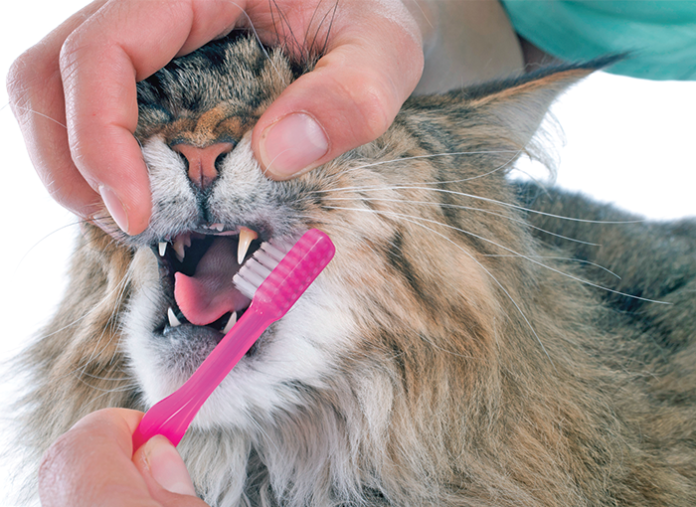Studies have shown that 50 to 90% of adult cats are affected by periodontal disease to some degree or another. These are pretty staggering statistics for our beloved pets, especially when you consider that dental disease can be a precursor to systemic infections and organ failure as well as being painful in and of itself.
Dental disease can occur in your cat’s mouth in several different ways: irritated gums, the buildup of transparent plaque on the teeth and its transformation into hard calculus (tartar), and even tooth resorption.
The gold standard for home dental care for pets is daily brushing along with regular professional dental cleanings at your veterinarian’s office. A variety of commercial products are available, including special diets, treats, toys, mouth rinses, and our topic of focus today: dental sprays.
What Are Dental Sprays?
Dental sprays are solutions that can be sprayed into your cat’s mouth and are intended to prevent or remove plaque. If plaque is kept to a minimum, it can’t develop into calculus, the nasty brown layer over teeth that is difficult to remove. Most dental sprays do not need to be applied directly to the teeth, as the product mixes with the cat’s saliva and is then circulated around the mouth as she licks and swallows.
Ingredients vary among products, but may include: chlorhexidine, alcohol, xylitol, essential oils, enzymes, herbs, or chlorine dioxide.
Follow the instructions on the packaging closely. Some products have different dosages based on the size of the pet. As with any product, you are more likely to see positive results if you use the spray consistently.
Multimodal Approach
Lindsey Schneider, DVM, Dentistry and Oral Surgery Resident at the Cornell University Hospital for Animals, says, “Ultimately, all homecare products are most effective when used as part of an overall dental care program that begins with a veterinarian examination and professional treatment. Daily tooth brushing is the most effective way of maintaining our pets’oral health and minimizing the progression of periodontal disease, and other homecare strategies (such as dental chews, water additives, sprays, etc.) work best when used in conjunction with tooth brushing.”
Many dental sprays claim that there is no need for brushing, but combining the two may be beneficial. Dr. Schneider says, “I think it would be fine to use the spray at the same time as tooth brushing (either immediately before or after), but I would refer to the manufacturer instructions for their recommendation.” Brushing physically dislodges plaque particles and may help the spray penetrate better.
Choosing a Product
“When discussing oral home care with clients, I refer them to the Veterinary Oral Health Council’s website,vohc.org, which contains a list of products that have been awarded the VOHC Seal of Acceptance,” says Dr. Schneider. “These products are awarded the sealonly if they meet pre-set standards of plaque and calculus (tartar)control in clinical trials. However, the results must be considered with a healthy dose of skepticism, as the trials are typically funded by the company selling the product.” Only one dental spray has been awarded the VOHC Seal: Essential HealthyMouth Anti-Plaque Oral Spray (eight ounces for $56.67 at healthymouth.com).
Few studies have evaluated how effective various substances are for controlling plaque and calculus in pets, and even fewer specifically in cats. Most of the ingredients in pet dental products were selected based on human studies.
While humans and cats do share plenty of traits and some of these ingredients may be beneficial for cats as well as humans, it is important to remember that we are not biologically the same and cats may not respond to things the same way that we do. For example, acetaminophen (Tylenol) is well-tolerated in people but extremely toxic to cats.
Keep an eye on the ingredients list too. Dr. Schneider warns that the essential oils menthol, eugenol, and thymol, commonly found in human dental hygiene products, can taste bad to cats. Cats also are more sensitive to essential oils than dogs, so care should be taken to not give too much of any spray that contains these substances.
Bottom Line
Little-to-no scientific data supports the use of dental sprays in cats, but a carefully chosen product is unlikely to do harm and could be a beneficial component of your cat’s dental health care plan.
Tooth Brushing
Yes, you can teach your cat to have her teeth brushed! Start by allowing her to lick a pet-safe toothpaste off your finger or a brush, and then gradually work up to brushing all of her teeth (you may need to start by getting her comfortable with having her face handled). Introducing tooth brushing should be a positive thing, so only work on it a little each day and don’t try to rush. It may take a month or more to complete the process, especially with older cats. Go to vohc.org to find recommended toothpastes, brushes, and more.




